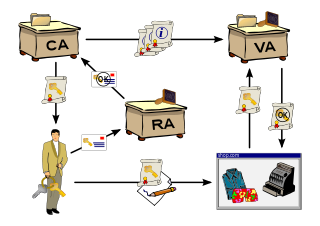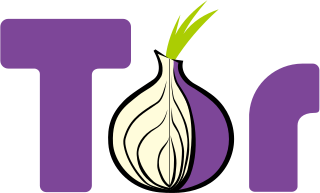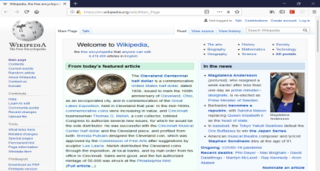
Hypertext Transfer Protocol Secure (HTTPS) is an extension of the Hypertext Transfer Protocol (HTTP). It uses encryption for secure communication over a computer network, and is widely used on the Internet. In HTTPS, the communication protocol is encrypted using Transport Layer Security (TLS) or, formerly, Secure Sockets Layer (SSL). The protocol is therefore also referred to as HTTP over TLS, or HTTP over SSL.

A public key infrastructure (PKI) is a set of roles, policies, hardware, software and procedures needed to create, manage, distribute, use, store and revoke digital certificates and manage public-key encryption.
In cryptography, X.509 is an International Telecommunication Union (ITU) standard defining the format of public key certificates. X.509 certificates are used in many Internet protocols, including TLS/SSL, which is the basis for HTTPS, the secure protocol for browsing the web. They are also used in offline applications, like electronic signatures.
In cryptography, a certificate authority or certification authority (CA) is an entity that stores, signs, and issues digital certificates. A digital certificate certifies the ownership of a public key by the named subject of the certificate. This allows others to rely upon signatures or on assertions made about the private key that corresponds to the certified public key. A CA acts as a trusted third party—trusted both by the subject (owner) of the certificate and by the party relying upon the certificate. The format of these certificates is specified by the X.509 or EMV standard.
In cryptography and computer security, self-signed certificates are public key certificates that are not issued by a certificate authority (CA). These self-signed certificates are easy to make and do not cost money. However, they do not provide any trust value.
Xcitium, formerly known as Comodo Security Solutions, Inc., is a cybersecurity company headquartered in Bloomfield, New Jersey. Under the brand Sectigo, the company acts as a web Certificate authority (CA) and issues SSL/TLS certificates.

.onion is a special-use top-level domain name designating an anonymous onion service, which was formerly known as a "hidden service", reachable via the Tor network. Such addresses are not actual DNS names, and the .onion TLD is not in the Internet DNS root, but with the appropriate proxy software installed, Internet programs such as web browsers can access sites with .onion addresses by sending the request through the Tor network.
Code signing is the process of digitally signing executables and scripts to confirm the software author and guarantee that the code has not been altered or corrupted since it was signed. The process employs the use of a cryptographic hash to validate authenticity and integrity. Code signing was invented in 1995 by Michael Doyle, as part of the Eolas WebWish browser plug-in, which enabled the use of public-key cryptography to sign downloadable Web app program code using a secret key, so the plug-in code interpreter could then use the corresponding public key to authenticate the code before allowing it access to the code interpreter's APIs.

An Extended Validation (EV) Certificate is a certificate conforming to X.509 that proves the legal entity of the owner and is signed by a certificate authority key that can issue EV certificates. EV certificates can be used in the same manner as any other X.509 certificates, including securing web communications with HTTPS and signing software and documents. Unlike domain-validated certificates and organization-validation certificates, EV certificates can be issued only by a subset of certificate authorities (CAs) and require verification of the requesting entity's legal identity before certificate issuance.
GlobalSign is a certificate authority and a provider of internet identity and security products. As of January 2015, Globalsign was the 4th largest certificate authority in the world, according to Netcraft.

Comodo Internet Security (CIS) is developed and distributed by Comodo Group, a freemium Internet security suite that includes an antivirus program, personal firewall, sandbox, host-based intrusion prevention system (HIPS) and website filtering.

DigiCert, Inc. is a digital security company headquartered in Lehi, Utah. DigiCert provides public key infrastructure (PKI) and validation required for issuing digital certificates or TLS/SSL certificates, acting as a certificate authority (CA) and trusted third party.
The Certification Authority Browser Forum, also known as the CA/Browser Forum, is a voluntary consortium of certification authorities, vendors of Internet browser and secure email software, operating systems, and other PKI-enabled applications that promulgates industry guidelines governing the issuance and management of X.509 v.3 digital certificates that chain to a trust anchor embedded in such applications. Its guidelines cover certificates used for the SSL/TLS protocol and code signing, as well as system and network security of certificate authorities.

Comodo Dragon is a freeware web browser. It is based on Chromium and is produced by Comodo Group. Sporting a similar interface to Google Chrome, Dragon does not implement Chrome's user tracking and some other potentially privacy-compromising features, replacing them with its own user tracking implementations, and provides additional security measures, such as indicating the authenticity and relative strength of a website's Secure Sockets Layer (SSL) certificate.
DigiNotar was a Dutch certificate authority, established in 1998 and acquired in January 2011 by VASCO Data Security International, Inc. The company was hacked in June 2011 and it issued hundreds of fake certificates, some of which were used for man-in-the-middle attacks on Iranian Gmail users. The company was declared bankrupt in September 2011.
Common Computing Security Standards Forum is a voluntary organization of vendors and providers of security software, operating systems, and Internet browsers.

Comodo IceDragon is a discontinued Firefox-based open source web browser from the Comodo Group for Microsoft Windows.

The Certificate Authority Security Council (CASC) is a multi-vendor industry advocacy group created to conduct research, promote Internet security standards and educate the public on Internet security issues.
Comodo Mobile Security (CMS) is a mobile application provided free by the Comodo Group that protects Android devices against viruses, worms and scripts. It also features SMS and call blocking, a software and process manager, data and apps backup and data traffic monitor. The anti-theft feature allows users to recover lost or stolen devices.
DNS Certification Authority Authorization (CAA) is an Internet security policy mechanism that allows domain name holders to indicate to certificate authorities whether they are authorized to issue digital certificates for a particular domain name. It does this by means of a "CAA" Domain Name System (DNS) resource record.









